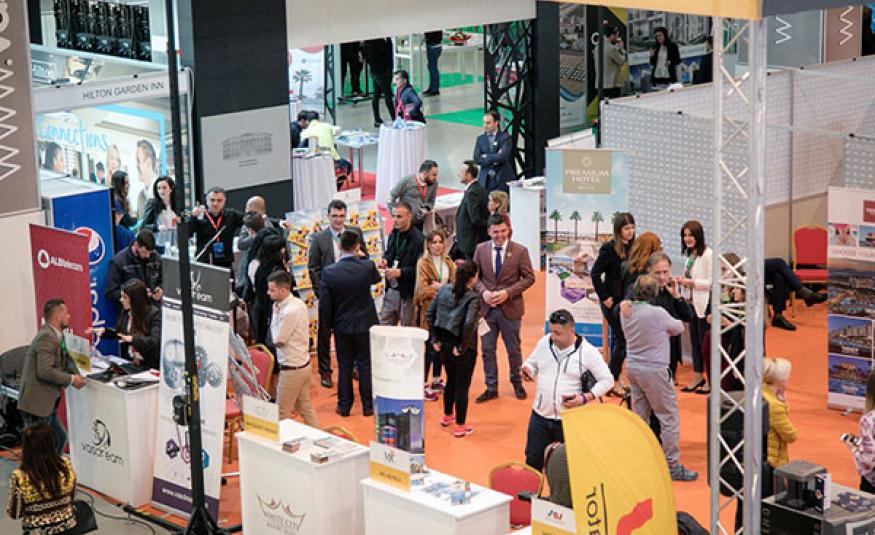EW asks three senior executives what they think our potential audience should know about the way global exhibitions are evolving, as featured in the latest edition of Exhibition World (Issue 3 | 2018), online now.
 Aida Lutaj
Aida Lutaj
CEO, Expocity Albania
Exhibitions stimulate economic development, advance national and regional industries and increase opportunities for foreign investments. By creating this platform locally, we help SMEs develop and add value to their businesses.
The mindset of the visitors needs to change further regarding the values of B2B. We see a growing need for B2B exhibitions, in major sectors where further investment is expected, and new partnerships are needed such as: renewable energy, agro-business and tourism. Despite rapidly growing technologies and digital formats for upcoming exhibitions, the importance of face-to-face conversations is not going to change.
When we talk about visitors’ behaviour and communication with visitors, it is important to know the demographics and cultural background of our target audience. It is also critical to tie this to the type of market we fall in, as this will change depending on the markets that are covered.
In the emerging markets there is more of a need (where it hasn’t been tapped to its full potential), for businesses to look at exhibitions as another marketing channel.
In the extended version, Aida Lutaj discusses the Balkans' trade show sector. Read her Guest Blog on Exhibition World online here.
Ten years ago, the events industry was feeling the uncertainty of the economic recession and the rapid evolution of digital media. Our customers’ businesses were changing in new and unprecedented ways, and traditional event formats weren’t providing enough value for our customers to achieve their goals. Our industry had to transform or become irrelevant. We needed to understand the pressures and challenges our customers were facing, and importantly, what they needed to succeed. This was the turning point where we knew we had to seek out deep customer and data insight.
We began to innovate and take risks in a completely new way. Not every idea was a winner, I can’t believe we ever worried about the floorplans at virtual tradeshows, but the thought process was right. We invested in things like digital platforms and targeted marketing. We listened intently, and sought to provide our customers with solutions based on their bespoke needs. Events are about bringing business to life. They have an energy that pulses through them, in the conversations you can overhear, the frenzy on the floor, and the smiles of people meeting for the first time.
Today’s events have evolved from being a simple marketplace to become community gatherings. Pairing digital resources with our deep data sets, we can bring people together, face to face, to meet and achieve their business goals.
You’ll find people trying to solve challenging industry problems in think-tank sessions, match-making apps being used to make connections, achievements being recognised by industry peers, and of course, people catching up with old friends. In every event, we want buyers and sellers to have a unique experience that allows them to meet the people they need, make connections, do business together, and hopefully, have a little fun.
 Eduardo López-Puertas
Eduardo López-Puertas
Director general, IFEMA
One of the factors that has marked the evolution is the change in the way company profitability is conceived and measured. The impact of the recent international crisis, coupled with the digital transformation, has altered company priorities, and consequently trade fair strategies as well. The new trade fair environment is focused on added value. Not just on creating the best business environment with the widest possible international reach, but on innovation and knowledge.
The challenge goes beyond creating platforms for sales, innovation and trends. IFEMA’s commitment to developing strategies and technologies to keep trade fairs going throughout the year, offering great connectivity, better business efficiency through digital agendas, and improving the experience before, during and after the fair, is already a reality.
Trade fairs are a unique opportunity to gain access to a broad international market in the same space and time, to incentivise innovation and competition, update and improve marketing strategies, and access all the technological support offered by a fair to make your participation worthwhile.
Beyond business, however, fairs also contribute intelligence and knowledge, the enrichment of discovering the latest trends and learning from industry leaders, and getting feedback on your own and others’ experiences, not to mention the potential for sectoral and social communication at trade fairs.
Image caption (top): Expocity Albania







